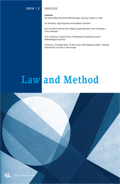|
Although shared legal problems are generally easily identified in transnational law design, it is considerably more difficult to design frameworks that transcend the peculiarities of local law univocally. The following exposition is a plea for giving more prominence to rigorous conceptual analysis in transnational law design in order to disambiguate the terms used in such frameworks. It does this by taking the formation of contracts in the model rules of the Draft Common Frame of Reference (DCFR) as a case in point. A conceptual analysis of the basic legal notion ‘juridical act’ in its model rules for contract law shows that the DCFR allows for two mutually conflicting interpretations of contract formation that are by no means fictional. A rigorous conceptual analysis of basic legal notions in the formative stages of transnational law design would have prevented a conflation of two legal traditions resulting in an ambiguous legal framework. As such it is an indispensable method for achieving a univocal interpretation of the legal end product. |

| Diversen |
|
| Authors | Rob van Gestel |
| Author's information |
| Artikel |
|
| Keywords | DCFR, Conceptual Analysis, Juridical Acts, Transnational Law Design |
| Authors | Rudolf Rijgersberg and Hester van der Kaaij |
| AbstractAuthor's information |
| Artikel |
|
| Keywords | skeptical legal education, academic learning, Critique, Knowledge, CLS, liberalism, power |
| Authors | Bart van Klink |
| AbstractAuthor's information |
|
In The Voice of Liberal Learning, Michael Oakeshott characterizes learning as a strictly non-instrumental activity. In schools and universities, knowledge is acquired for its own sake. Obviously, this liberal understanding of education differs fundamentally from a ‘critical’ notion of education as advocated by Duncan Kennedy and other members of the CLS movement. From a ‘critical’ perspective, Oakeshott’s conception may be seen as yet another attempt – typical for liberalism and conservatism alike – to depoliticize the process of knowledge production and reproduction and to conceal (and thereby to strengthen and legitimize) its effects on the distribution of power, wealth, status and so forth in society. In this paper, the author will confront both views with each other, especially within the context of legal education. The general purpose is to develop a notion of skeptical legal education, which is to a large extent based on Oakeshott’s understanding of liberal learning but which relativizes its insistence on the non-instrumentality of learning and reinforces its critical potential. |
| Artikel |
|
| Keywords | legal paradigm, scientific revolution, social theory, reflexivity, responsibility, risk society, cosmopolitanism |
| Authors | Ubaldus de Vries |
| AbstractAuthor's information |
|
This article seeks to describe a paradigmatic view on legal research, based on the thought processes underlining Kuhn’s The Structure of Scientific Revolutions, in particular as how revolutionary change is coming about through a reflexive attitude towards developments that do not fit in the prevailing assumptions in an existing paradigm or research methodology. It allows for a description of ‘normal legal research’ and the assumptions upon which normal legal research is based. It also allows for an explanation as to how these assumptions are no longer exclusively valid but carry with them limitations in the face of structural developments at the level of society. An important feature of the paradigmatic view, then, is that it is able to take issue with these developments by incorporating social theory in our understanding of law. |


